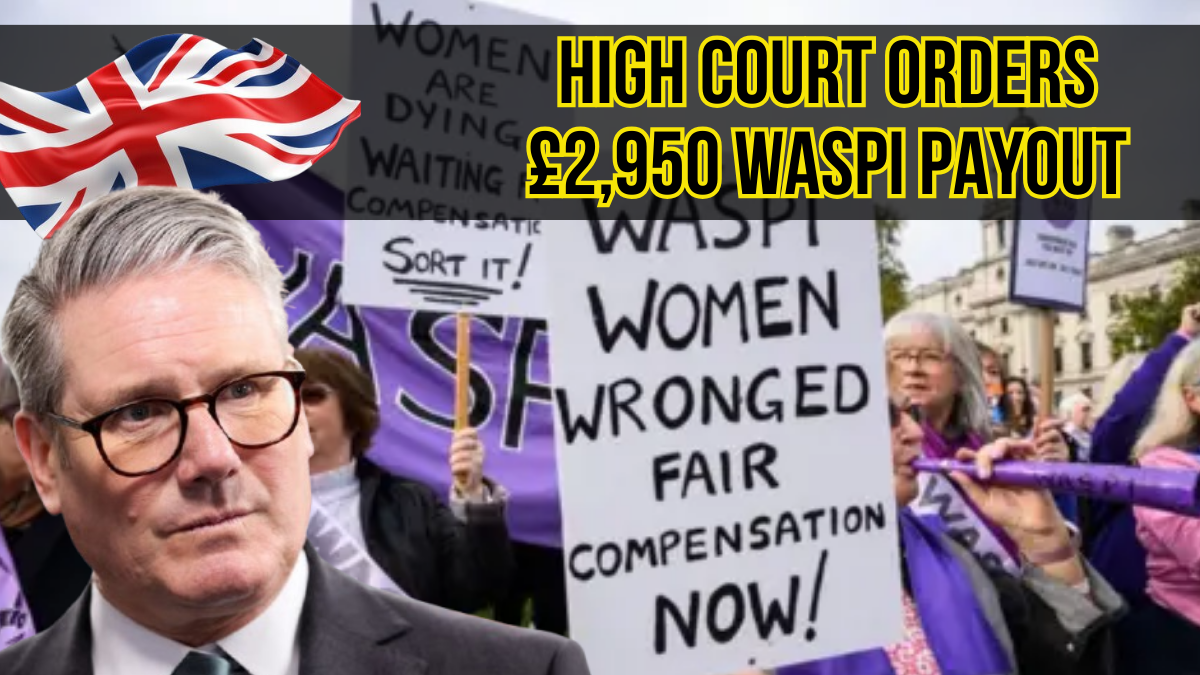A major legal turning point is approaching for millions of women born in the 1950s who were impacted by changes to the UK State Pension age. The Women Against State Pension Inequality (WASPI) campaign is awaiting a High Court decision that could pave the way for each affected woman to claim up to £2,950 in compensation from the Department for Work and Pensions (DWP).

The case centres on accusations of maladministration by the DWP, specifically the department’s failure to give adequate and timely notice of pension age increases. Many of these women say the late communication upended their retirement plans, forcing them into financial difficulty and emotional distress.
What Is The Origins of the WASPI Campaign?
The WASPI movement was formed in response to the Pensions Act 1995 and its accelerated changes under the Pensions Act 2011. These legislative reforms aimed to bring the State Pension age for women in line with men, increasing the retirement age from 60 to 65 and later to 66–67.
While the policy goal was equality, the communication process was deeply flawed. Many women only learned about these changes one or two years before they were due to retire at age 60 far too late to make alternative financial plans.
The impact was significant:
- Retirement plans disrupted without warning
- Some women forced to work longer in physically demanding jobs
- Others had to take on debt or spend life savings unexpectedly
WASPI, led by campaigners such as Angela Madden, has consistently argued that the government failed in its duty to inform citizens clearly and in good time.
Quick Summary Table
Area |
Details |
|---|---|
Campaign Name |
Women Against State Pension Inequality (WASPI) |
Legal Issue |
DWP maladministration in notifying pension age changes |
Potential Compensation |
Up to £2,950 per woman |
Number of Women Affected |
Approx. 3.8 million (born in the 1950s) |
Key Legal Factor |
High Court cost-capping decision |
Government Stance |
Acknowledges delays but rejects compensation |
Official Site |
Eligibility for Potential Compensation
If the High Court rules in favour of WASPI, an estimated 3.8 million women could qualify for payments. The maximum payout discussed is £2,950 per person, though no final figure is confirmed.
This amount is based on previous Parliamentary estimates of the financial and emotional harm caused by the poor communication.
Category |
Estimate |
|---|---|
Women Affected |
3.8 million |
Potential Payment Each |
Up to £2,950 |
Total Government Liability |
Over £11 billion |
Current Status |
Awaiting legal ruling |
Ombudsman Findings: DWP at Fault
In 2021, the Parliamentary and Health Service Ombudsman (PHSO) found that the DWP committed maladministration by not providing adequate notice of the pension age changes.
The Ombudsman agreed that these communication failures caused hardship but stopped short of recommending direct financial compensation. This left WASPI with no choice but to pursue legal action through the courts.
The current legal case seeks to secure formal recognition of the harm caused and a financial remedy for those affected.
DWP’s Position: Acknowledgement but No Compensation
The DWP has admitted there were communication delays, with some women waiting up to 28 months for updates on their pension age. However, the department disputes the Ombudsman’s conclusions about the scale of injustice and the need for compensation.
In a public statement, the DWP said it has to be apologized for the delays but would not be issuing payments. It argues that changes to the pension age were legislated well in advance and that women had sufficient opportunity to adapt a position WASPI strongly contests.
Key Legal Hurdle: Cost-Capping Decision
The High Court will soon decide on cost-capping, a legal mechanism that can limit the financial risk for campaigners in bringing a case against the government.
If WASPI secures cost-capping, it can proceed without the risk of being liable for enormous legal costs should it lose. If denied, the group may have to explore alternative legal or political avenues.
Upcoming Developments to Watch
The next few weeks could determine the future of the campaign. Key milestones include:
- High Court Ruling on Cost-Capping – Will WASPI be able to continue its legal fight?
- Fundraising Efforts – Ongoing public donations are vital for the case.
- Potential Parliamentary Debate – Public and political pressure may revive the issue in Parliament.
- Possible Appeals – If cost-capping is refused, WASPI may appeal or shift its strategy.
Wider Implications
The outcome of this case will not only impact the women directly involved but may also set a precedent for how government departments communicate major policy changes in the future. A victory for WASPI could influence compensation frameworks in similar disputes.
Frequently Asked Questions (FAQs)
Q1: How much could each WASPI woman receive?
A: Up to £2,950 per person, depending on the court’s decision.
Q2: Who is eligible for compensation if WASPI wins?
A: Women born in the 1950s whose pension age increased without sufficient notice.
Q3: Has the DWP agreed to pay compensation?
A: No. The department admits to delays but rejects the need for payments.
Q4: What is cost-capping?
A: A legal safeguard that limits the amount campaigners may have to pay in legal costs if they lose a case.
Q5: When will the decision be made?
A: A High Court ruling on cost-capping is expected in the coming weeks.
For More Information Click HERE




